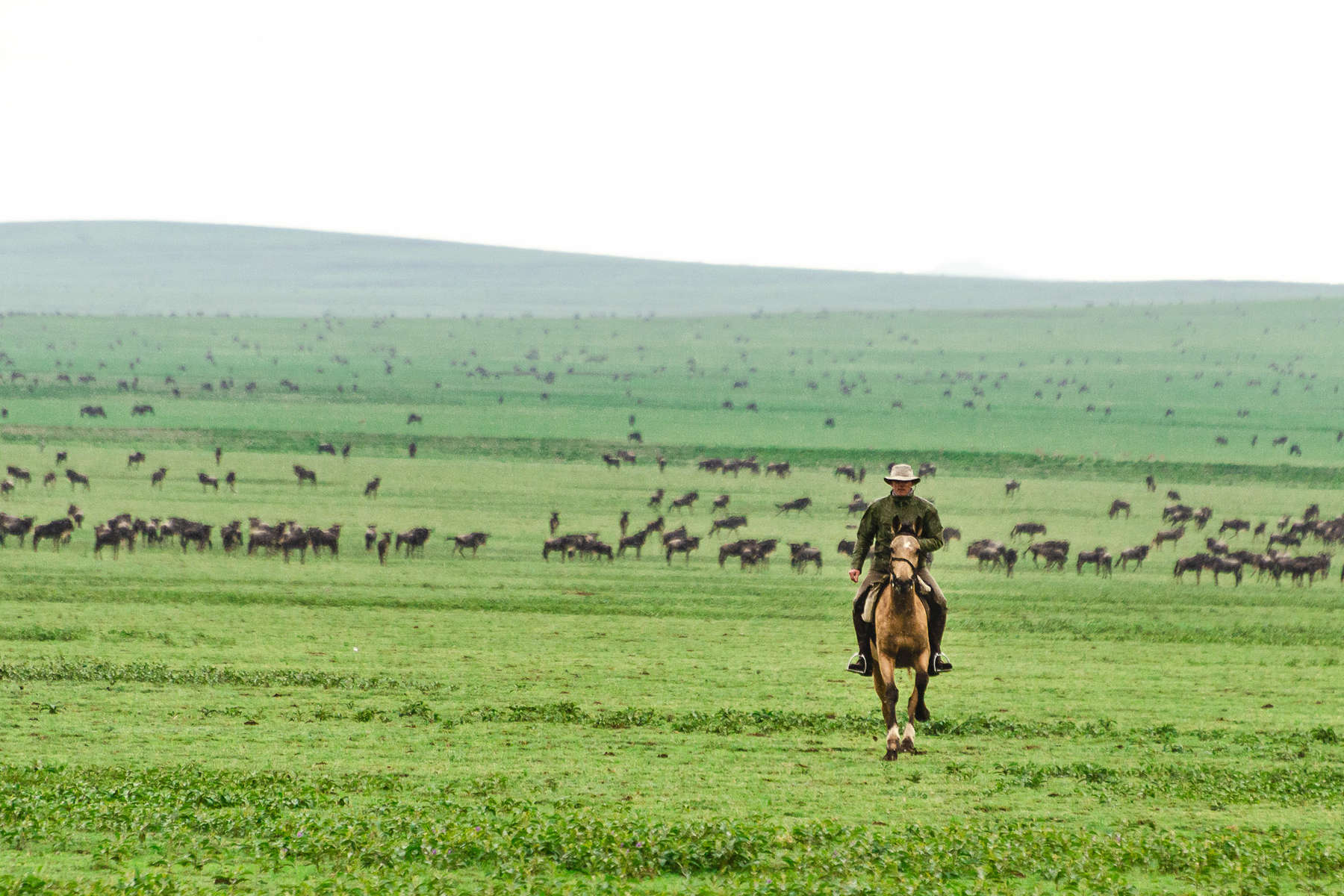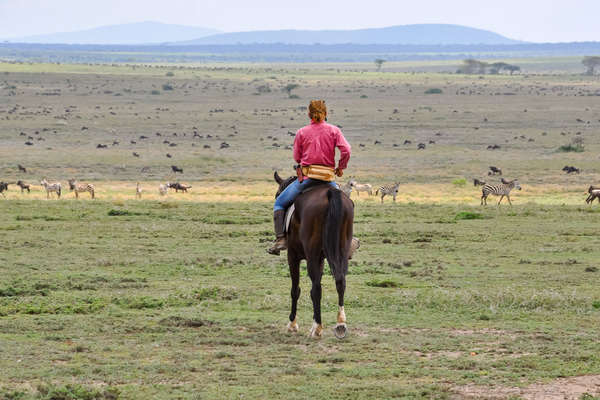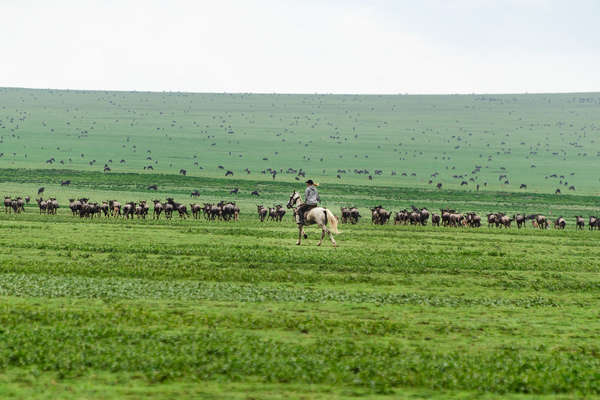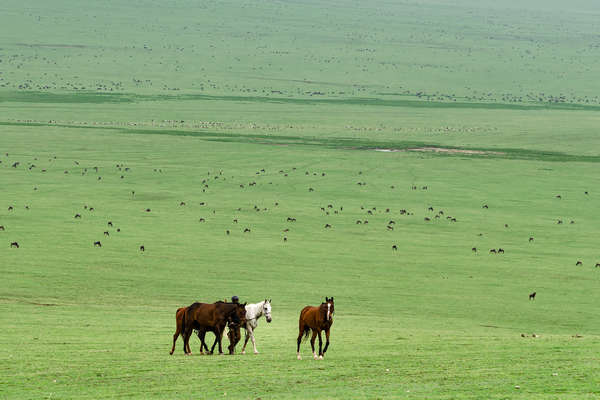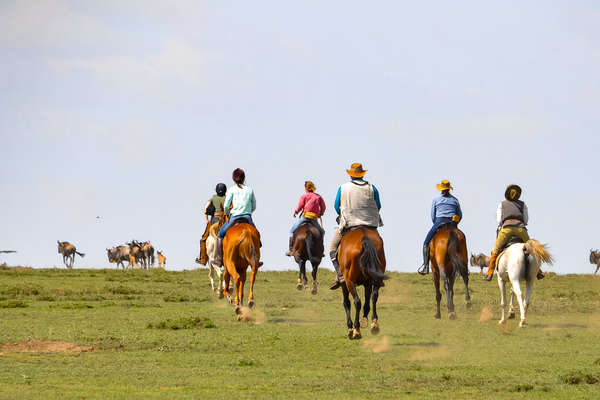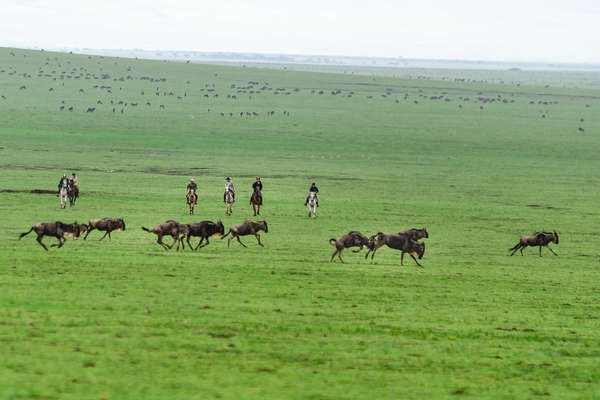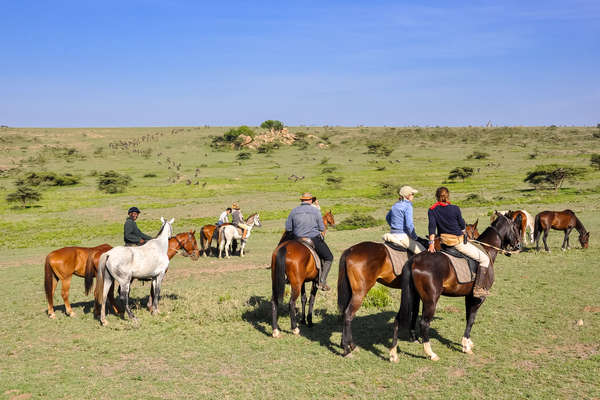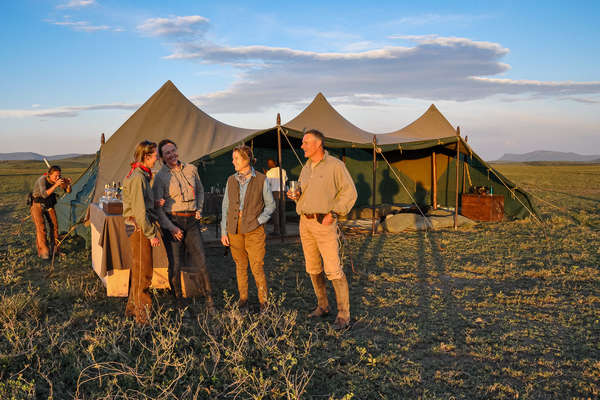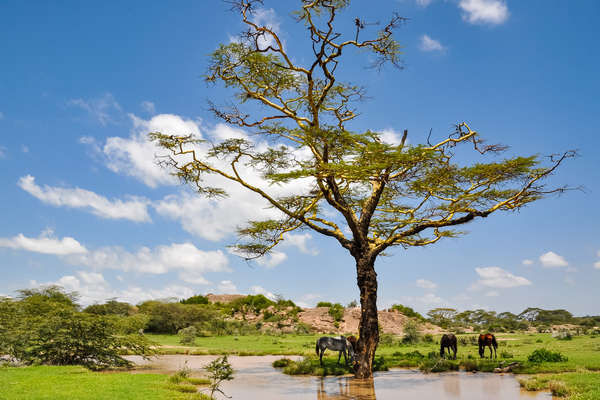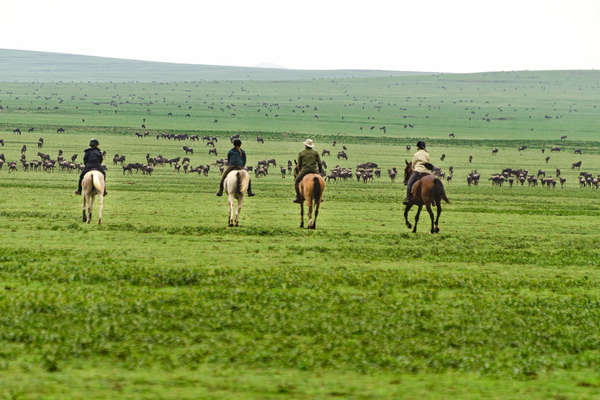Comfort
Permanent Camp/Lodge (1 night): The first night is spent at a lodge (availability dependent) situated on a golf, polo, and wildlife estate, only 40 minutes’ drive from Kilimanjaro international airport. Each room has its own on suite bathroom, flush toilet, and white fluffy towels. There is WIFI, a swimming pool to be enjoyed and SPA treatments, yoga, golf, polo can be arranged prior to arrival.
Mobile camp (7 nights): They are comfortable and spacious, being 4 X 4 meters with mosquito netted doors and windows to allow for ventilation but remain insect proof. Each tent is provided with a carpet, towel rack, bedside table and water bottle, bed and cotton linen and a solar light. Outside each tent there is a veranda with chairs and a washstand that you share with your tent partner. Each tent has its own bush toilet and bucket shower. The toilet is a traditional short drop style toilet with a nice wooden toilet seat over a metal box with open sides. Our motto is "Rhinos cover it please do the same". There is a small mound of dirt with a trowel next to the toilet seat for this purpose. The shower is a traditional star gazing canvas bucket.
Meals
Local chefs will be preparing all of your meals.
- Traditional breakfasts with juice, tea and coffee.
- Lunch will be prepared on the spot when the logistic team joins you at mid-day.
- For dinner, the chefs will cook delicious local and international dishes, always accompanied by bread and fresh salads.
All drinks are included in the mobile camp, however not at the lodge.
Climate
Tanzania has two distinct climatic zones:
- The Highlands (more than 1500, altitude). It is a pleasant semi-tropical climate.
- The coast, with a humid equatorial climate
The higher the terrain, the lower the temperatures will be. As you get closer to the Indian Ocean, temperatures will get warmer and sometimes it is very hot!
Seasons:
- Dry season: From May to October. The hottest months are from December to February.
- Long Rains season: From mid-March to early May. However, the high rainfall month is April. Evenings can be cool, even cold.
- Short rains season: Early November to mid-December. During these months it does not rain all day, only at certain times.
Tips
The guideline from the local team is 30 USD per guest per night for the shared /communal tip, total of 240 USD per person for the entire safari. If one wishes to give any specific crew member something extra, please feel free to do so yourself at any time during the safari. Your lead guides are not included in the shared tip and if one wish to tip please do so directly to the guides, a suggested guideline of 500 USD per guest per safari.
Packing list
Important: For horse safaris, you should wear neutral coloured clothing (green, brown, beige or grey) to blend in with the landscape.
Please don't take a hard sided suitcase. Your luggage should be soft sided, particularly for light air transfers. A very strict weight limit of 15 KG per person, including hand luggage applies on the small aircraft transfer.
Head
- A riding helmet is strongly recommended and often compulsory. We recommend that you take your own to ensure a correct fit. Helmet manufacturers (GPA, HKM, LAS Helmets, Lamicell, Troxel, Equithème) now offer horse-riding helmets that are ventilated, strong, light and comfortable. You also have the option of buying protective shells to go under your hats (Ranch & Rider, Lexington Safety Products) or western hat helmets (Troxel)
- Sunhat for when not riding - Essential
- Sunglasses with high UV protection- they should have a cord attached so they don't fly off when riding
- Buff or bandana for protecting your neck and face from the sun.
Upper body
- 4-6 Long-sleeved shirts to provide protection from the sun (quick dry fabric)
- T-shirts and jumpers for the evening
- Lightweight fleece or jumper - some nights can be cold
- Waterproof jacket - rain can be difficult to predict and it's better to be prepared.
Legs
- 2 pairs of lightweight, comfortable riding trousers, jeans or chaps - we recommend riding in them at home before taking them on holiday to ensure they don't rub.
- Casual clothes for the evenings (jeans or walking trousers)
- A swimming costume may be useful.
- Non-irritant cotton or synthetic underwear
Hands and Feet
- Light hiking boots or comfortable riding boots. We recommend short boots with half chaps.
- Lightweight shoes or trainers for the evenings
- Several pairs of socks
- Gloves - your hands are particularly exposed to the sun.
Horse riding extras
- A soothing cream may be useful to treat areas irritated by long hours in the saddle
- Backpacks are not permitted whilst riding. You can carry all your small belongings (lipstick, sunscreen, passport, mini camera, glasses, etc.) inside your jacket's pockets or in the saddlebags.
Other useful items
- Travel bag, preferably a soft bag 70-100ltrs (15kg max.)
- Water bottle (1.5l)
- Head torch or small torch for moving around at night - bring spare batteries and bulbs
- Toiletries (biodegradable wipes to replace water)
- Swiss army knife or equivalent (in checking-in luggage!!)
- Backpack of 25-30ltrs
- Earplugs (may be useful)
- Camera and high capacity memory card. Spare battery
- A pair of binoculars
- Small plastic bags to throw in the trash.
Medical kit - Medical kit - A First Aid Kit is always carried in the back up vehicle on safaris, although we ask guests to bring any required medics as well as malarial prophylaxis.
Make sure any allergies (to medication or otherwise) are clearly stated in your medical kit
- Any medication you regularly take
- Painkillers
- Imodium or similar anti-diarrheal medication
- Vitamin C tablets
- Sunscreen and lip balm - should be high factor
- Insect repellent
- Eye drops
- Hydrating/ soothing cream
- Plasters
- Blister plasters in case of any rubs
- Antiseptic cream, plasters, aspirin, anti-histamine, insect-bite salve etc..
- 10cm wide bandage
- Spare prescription glasses/contact lenses
- Re-hydration sachets
- Antiseptic wipes
- Hand wash gel
General information
- The internal flight only allows up to 15 kg per passenger and no more than 100ml of liquids. Please don't take a hard sided suitcase. Your luggage should be soft sided, particularly for light air transfers.
- We recommend taking any valuables, such as your camera, iPod, iPad, medicines and glasses etc. in your hand luggage. Travelling in your riding boots and carrying your hat and some riding clothes is highly recommended - then if your luggage goes astray you are still able to ride!
- We recommend taking a copy of your passport and insurance documents with you in case you lose your originals.
- If, in wishing to 'travel light', you plan to wash your clothes throughout the trip, please ensure you bring biodegradable laundry products with which to do your washing.
- Ensure you bring something for your chemical waste (batteries, aerosol cans, cream tubes, plastic wrapping), in order to take it back to Europe where recycling and waste disposal is done well and effectively. We advise to, wherever possible, avoid altogether bringing wrapped products to Tanzania. If you do, ensure you take them back to Europe with you

